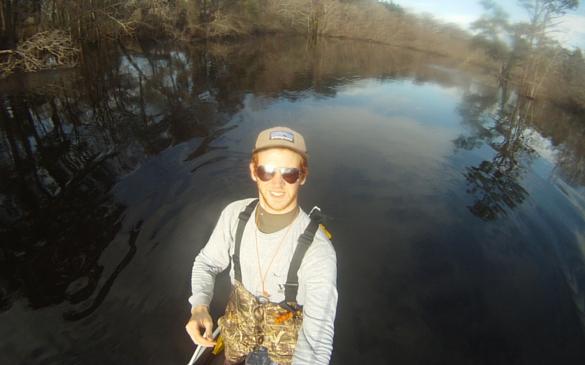By: Katie Sanders, Staff Writer
“I didn’t want to define it as a landscape, or a history or a people. I wanted to define it by how it affected me,” Caleb Rogers says, as he explains what he was searching for when he set out to re-explore the explored and canoe for nine days by himself down the Waccamaw River during interim. He started in North Carolina and travelled over 130 miles to South Carolina, camping along the banks of the river at night and checking in with his advisor, Professor John Lane, every couple of days.
The first two days were arduous. Rogers’s motto became “figure it out.” He realized he didn’t check his equipment thoroughly upon discovering he had no rain cap or poles for his tent. After the first two miles of his journey, he hit a flooded swamp and couldn’t check his map for having to paddle constantly to avoid trees and debris in his fiberglass canoe. He took two wrong turns because of altered current patterns, also due to flooding.
But on the third day during miles 33-39, Rogers became hyper aware of his surroundings. In his journal he asked himself, “What is the river saying when it’s quiet?”
“The river has it’s own language. A language is a pattern of sounds that convey meaning. If you can listen to the river’s language you gain meaning from it. The river makes sounds through the patterns of life, and this life helps you understand where you are. Never before has everything I’ve heard around me been important, and meant something. It’s not like listening to your iPod where the sound doesn’t matter.”
Eventually he began to personify his surroundings. “I saw two old trees leaning against each other. I believe they were an oak and a Cyprus. I named them the ‘Old Friends,’ because I really did feel like they were old friends.”
Rogers jokes that this is the point where he “became a hippie.”
Around day seven, he realized along the way his efforts had switched allegiance, from resisting the river to working with it.
“At first I was fighting the river. Then I gave up, and began connecting with my surroundings.”
He was so engrossed in this connection that he kayaked through the night going into day eight, so he could experience one last adventure before the trip was over.
He wrote in his journal, “I know it’s not safe and I know it’s a bad decision. But I want to see the stars one last time. I want to be surrounded by them and see them dance on the water… I don’t mean to sound like a poet or a hopeless romantic, but that would be mesmerizing.”
Rogers reflects on what made his time on the Waccamaw so meaningful.
“A river is one of the last wild places left, one of the last places where you can be completely surrounded by pure, real experience. Everything you hear, feel and sense matters, and it has a direct impact on you.”
As far as defining the river’s effect, which was the original goal, Rogers says that he appreciates the environment more.
“It built my appreciation of having a connection with the environment. I had never had that before, and I came to a point where it upset me to lose that connection.”
Although he was sad to see his nine days on the Waccamaw end, he knows he is not done exploring. Rogers plans on taking more solo canoeing trips in the future.






























